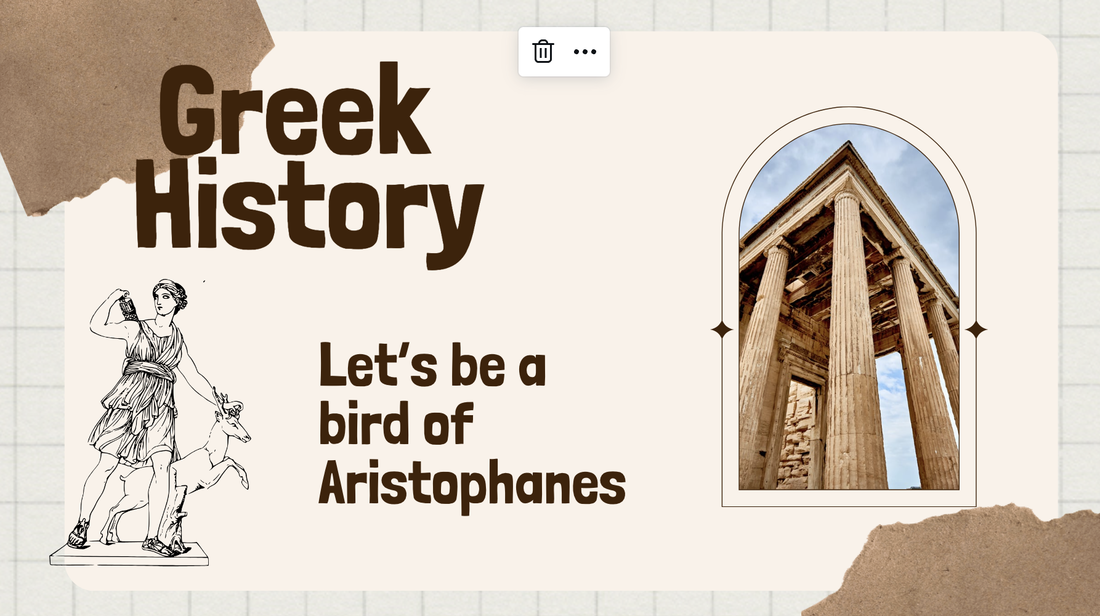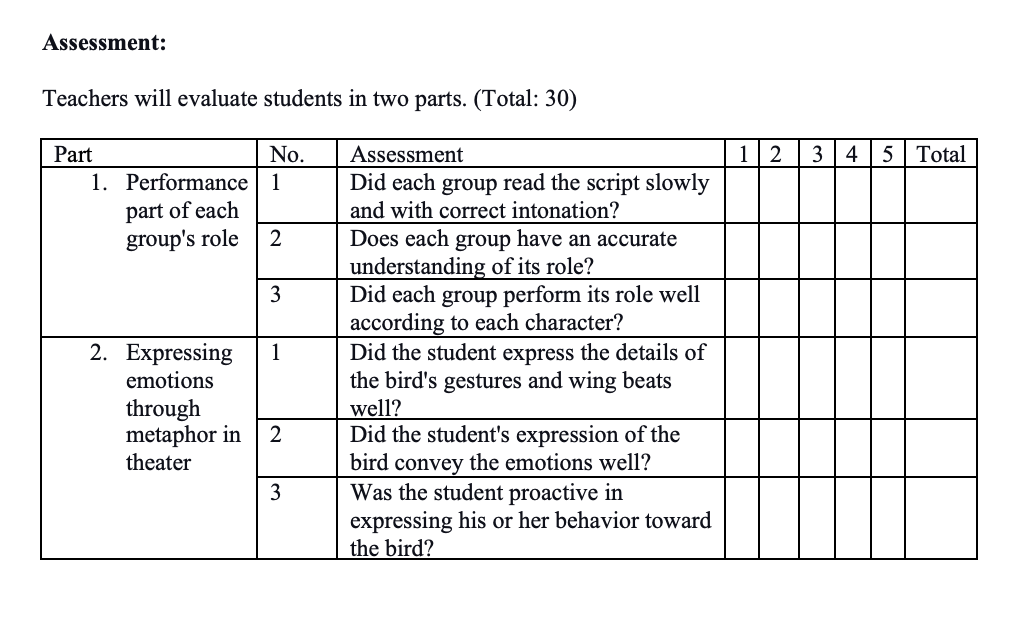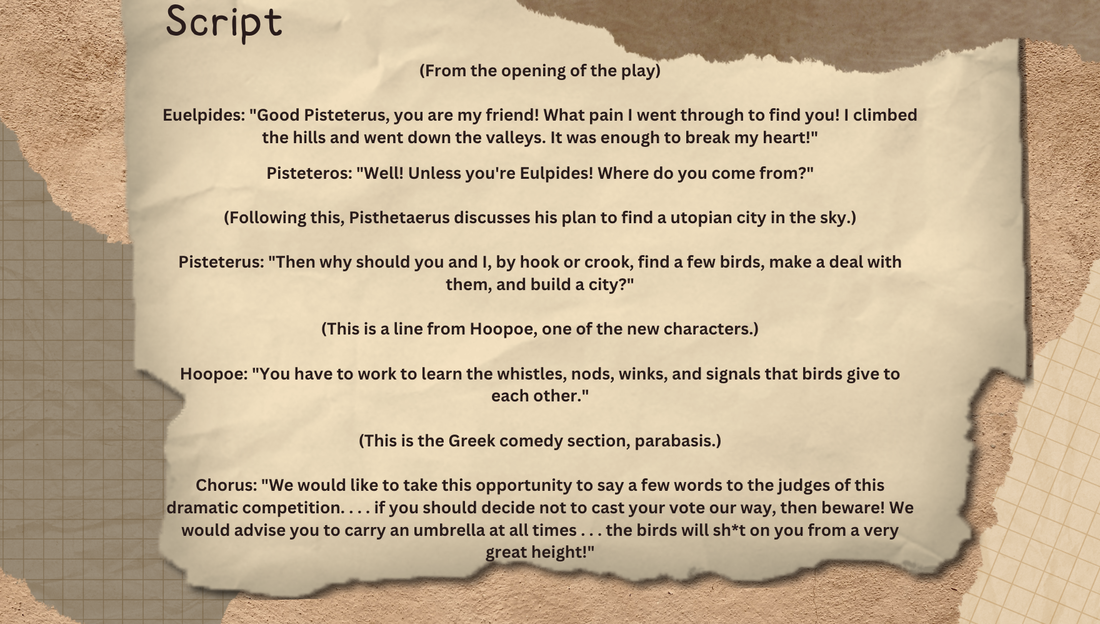Let's be a bird of Aristophanes (Greek History)* Educational Theatre Lesson Plan for learning Greek History. Grade level: 11th grade Objective: Students will learn typical plays from ancient Greek comedy, full of witty lines and clever puns, by reciting and acting out lines from one of Aristophanes' plays, "The Birds (Orhithes)", to express their feelings through metaphor. 1. Students will sit in a circle around the teacher. 2. The teacher summarizes the Greek period's plays and explains what achievements Aristophanes made as the first Greek comic playwright and what influence he had on theatre. 3. The teacher will explain "The Birds" from Aristophanes' work. 4. The teacher explains parabasis, a section of Greek comedy in which the chorus addresses the audience directly with commentary on various topics. 5. The teacher will hand out to each student a piece of paper with a script written, including the representative opening and parabasis passage and final passages from which students can learn about metaphors in the play. 6. The teacher will have students monologue this script. (From the opening of the play) Euelpides: "Good Pisteterus, you are my friend! What pain I went through to find you! I climbed the hills and went down the valleys. It was enough to break my heart!" Pisteteros: "Well! Unless you're Eulpides! Where do you come from?" (Following this, Pisthetaerus discusses his plan to find a utopian city in the sky.) Pisteterus: "Then why should you and I, by hook or crook, find a few birds, make a deal with them, and build a city?" (This is a line from Hoopoe, one of the new characters.) Hoopoe: "You have to work to learn the whistles, nods, winks, and signals that birds give to each other." (This is the Greek comedy section, parabasis.) Parabasis: "We would like to take this opportunity to say a few words to the judges of this dramatic competition. if you should decide not to cast your vote our way, then beware! We would advise you to always carry an umbrella . . . the birds will poop on you from a very great height!" 6. The teacher asks students to play four roles. For this purpose, students will be divided into four groups and assigned parts. (Euelpides, Pisthetaerus, Hoopoe, Parabasis) 7. Give each group time (30 minutes) to practice their lines for their role. 8. The teacher will first help the students act out the passages given according to the roles of the four groups. 9. After the teacher has made sure the students have completed their roles in each group, the teacher will read the following lines from the Hoopoe aloud to the students to teach metaphors from the play. Hoopoe: "You have to work to learn the whistles, nods, winks, and signals that birds give to each other." 10. The teacher will now ask each student to act out the Hoopoe's lines as if they were birds. Explain that at this time, you can use props such as paper, tissue, chairs, and colored paper nearby. 11. Following the teacher's instructions, students will each metaphorically express the appearance of a bird according to Hoopoe's lines. And encourage them to discuss with each other what emotions each signal represents. For example, one student whistled in a sad tone. He cranes his neck, flaps his wings, and whistles like a bird. Other Students will write down how they are feeling on a piece of paper in front of them. 12. At the end, the teacher will ask all students to imitate the bird they imagine. Students will all fly according to the bird's habits and how they imagine the bird to be. Assessment: Teachers will evaluate students in two parts. 1. Performance part of each group's role 2. Expressing emotions through metaphor in theater Reflection: While watching the video "A Visual Timeline of the History of Theatre", I became interested in Greek theater, the root of modern theater. The Greeks built arenas in each city and held theater competitions every year. In addition, a style and system for composing plays according to scenes and acts was developed and used in modern plays. Theater is compelling in our society because of its culture and history. Theater has become a vital part of our society for thousands of years. So, it will continue to become more critical over time. In this respect, I chose Greek plays that had a significant influence on modern theater and did more research on Aristophanes, the first comic playwright. Meanwhile, I decided to use metaphors to express emotions for 7th-12th grade students to express their feelings and achieve catharsis through plays. Aristophanes' works have a charm that allows us to endure and overcome life's storms with laughter through metaphors and satire. Among them, I chose 'Bird,' the most accessible play to understand. When I read this work, I was very interested. It is a sophisticated play in the right place, even for modern people to read. It is an exciting play with satire on social conditions, almost like contemporary reality. I reorganized the paragraphs of this play by condensing the plot into a more predictable form that included both the chorus and parabasis parts of Greek plays. And I planned to present this in a format that students could read and act along with. Later, as I wrote down this plan, I was happy to imagine the students taking the form of birds and flying around. I think their happy appearance will be precisely what Aristophanes, a Greek playwright, wanted long ago. Reference: www.cornellcollege.edu/classical_studies/comedy/comedy1/Birds.htm
0 Comments
Leave a Reply. |
Myungja Anna KohArtist Categories
All
Archives
July 2024
|
Proudly powered by Weebly




 RSS Feed
RSS Feed